African livestock producers have a unique opportunity to reap higher returns from animal products due to modern breeding technologies and innovations that can now make animals adapt to climatic changes.
This is according to a recent study published by Nature Genetics.
With the right support, these advancements can enhance not only animal productivity but also help livestock to become climate resilient according to a press release sent to media houses.
Further, through strategic investment and collaboration, African livestock systems can harness tools such as genomic technologies and breeding programs to drive genetic gains.
Supported by the African Animal Breeding Network (AABNet)—a platform of genetics experts, animal breeders, and professionals providing training, advice, and support—these efforts could lead to more resilient, efficient, and sustainable livestock production, strengthening food security and rural livelihoods across the continent, researchers say.
Professor Appolinaire Djikeng, Lead Author of the Study and Director General for the International Livestock Research Institute (ILRI) affirmed that in the past, genetic improvement efforts have largely focused on maximizing productivity, often overlooking environmental and climatic factors.
He noted that Africa has a unique opportunity to take a different approach—one that balances productivity with environmental sustainability, while ensuring interventions are farmer appropriate and support livelihoods.
“If we design breeding programs with climate adaptation and mitigation in mind, farmers get access to hardier, more productive livestock—and we build livestock systems that work for both people and the planet,” advised Prof. Djikeng.
Currently, around 85 percent of the world’s livestock keepers are in sub-Saharan Africa (SSA), yet they produce only 2.8 percent of global meat and milk outputs. This productivity gap, the researchers say, highlights a significant opportunity to enhance efficiency and climate resilience through improved genetics.
Additionally, the researchers believe that a rapidly growing and urbanizing population is set to increase demand for livestock products. In West Africa alone, which has the largest share of the continent’s livestock, demand for meat, milk, and eggs is projected to rise by 50 percent by 2050.
An international team of researchers, led by the Centre for Tropical Livestock Genetics and Health (CTLGH), conducted the study titled “The African Animal Breeding Network” as a pathway towards genetic improvement of livestock, which explores the potential for genetic gains in African livestock and how AABNet could contribute to transforming livestock production systems.
The network enables and facilitates a system of genetic evaluation across multiple African countries, collecting, storing, and sharing livestock data to support the development of higher-quality, more productive animals.
It also plays a key role in professional development, educational partnerships, training events, and entrepreneurship, promoting strategic collaborations to accelerate progress.
This, according to Prof. Mizeck Chagunda, Director of CTLGH, represents a timely opportunity, with support from AABNet, to improve agriculture and food systems at a time of population growth and changing climate, towards the United Nations’ and Africa Union’s vision for the continent.
In addition, AABNet connects animal breeders across Africa, enabling them to share information, evaluation systems, and tools to improve productivity and genetic advancements.
The study highlights the power of collaborative thinking in harnessing advances in genomic technology, digital tools and information and communications technology to establish a foundation for sustainable livestock improvement programs in Africa, researchers maintain.
By Michael Omondi





